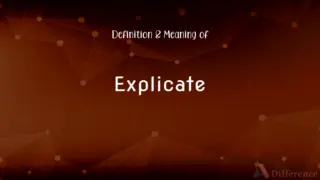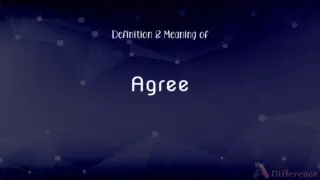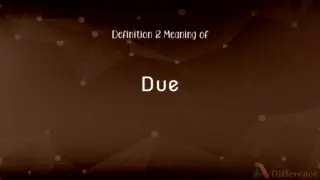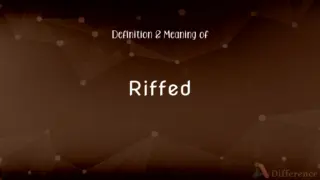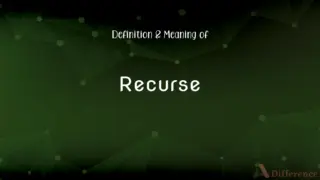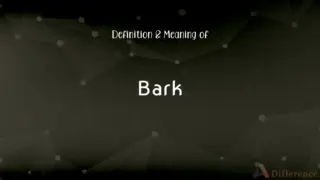Haver Definition and Meaning
By Tayyaba Rehman & Urooj Arif — Updated on March 5, 2024
Haver refers to speak or act indecisively or equivocally. e.g., He tended to haver when asked to make quick decisions.
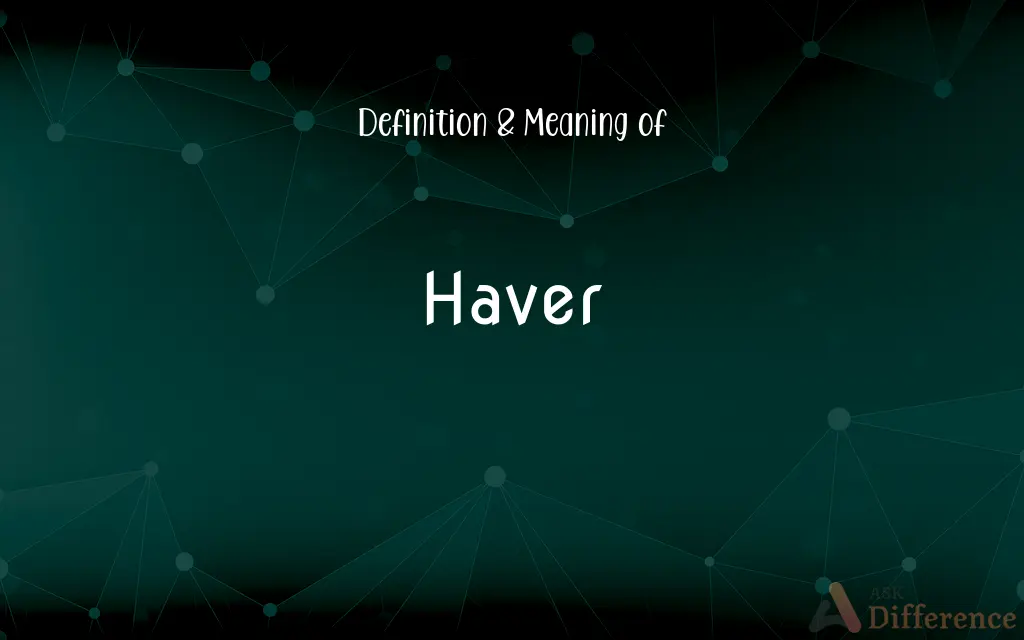
Table of Contents
Haver Definitions
To waver in opinion or thought
The jury seemed to haver on the verdict.
To be indecisive or irresolute
She would haver for hours before choosing a dress.
To speak in an uncertain or vacillating manner
During the meeting, he tended to haver about the final decision.
To falter or stutter in conversation
When asked about his plans, he began to haver nervously.
To mumble or speak incoherently
Lost in thought, he would often haver to himself.
To gossip or talk idly
They would haver over coffee about the latest neighborhood news.
To babble or chatter pointlessly or meaninglessly
The toddler would haver endlessly about his toys.
(British) To hem and haw.
(Scotland) To talk foolishly; to chatter.
Oats (the cereal).
One who has something (in various senses).
The person who has custody of a document.
A possessor; a holder.
The oat; oats.
To maunder; to talk foolishly; to chatter.
During the meeting, he seemed to haver, unable to make a clear point.
To hesitate in speech or action
He havered at the door, unsure whether to enter.
To be ambiguous or unclear in speech
Her directions were confusing because she havered between two routes.
To ramble without a clear point
In his lectures, he tends to haver, losing his audience's attention.
Haver Snonyms
Falter
To show hesitation or uncertainty in speech or action.
His voice faltered as he recounted the incident.
Vacillate
To waver between different opinions or actions; be indecisive.
She vacillated for weeks before choosing her major.
Dither
To be indecisive.
I can't watch him dither over the menu for hours.
Stammer
To speak with sudden involuntary pauses and a tendency to repeat the initial letters of words.
Nervously, he began to stammer his name and address.
Babble
To talk rapidly and continuously in a foolish, excited, or incomprehensible way.
He babbled on about his adventures without pausing.
Rambling
Lengthy and confused or inconsequential.
His speech was rambling and barely touched on the main points.
Hesitate
To pause before saying or doing something, especially through uncertainty.
He hesitated before answering the difficult question.
Waver
To sway to and fro; to fluctuate or vacillate in decision or opinion.
His determination never wavered, even in the face of adversity.
Mumble
To say something indistinctly and quietly, making it difficult for others to hear.
She mumbled her apology, looking down.
Beating around the bush
To avoid talking about what is important.
Stop beating around the bush and tell me what you really think.
Haver Idioms & Phrases
Haver on a point
To talk at length about a particular point without making progress.
He kept havering on a point that was already resolved earlier.
No time to haver
A situation where there is an urgent need for decisive action without delay.
With the deadline approaching, there’s no time to haver.
Haver in decision
To be indecisive or to vacillate when making a decision.
We can't afford to haver in decision at this critical juncture in the project.
Haver and dither
To be indecisive and hesitant, especially in speech or action.
The committee's haver and dither resulted in the loss of a valuable opportunity.
Haver at length
To talk excessively without coming to a conclusion or point.
He would often haver at length about trivial matters.
Haver about choices
To be indecisive when presented with multiple options.
She spent hours havering about choices for the new kitchen design.
Haver over a decision
To be excessively indecisive about making a specific decision.
He havered over the decision to buy a new car for weeks.
Haver over details
To spend too much time discussing or considering minor details.
We can't afford to haver over details when the broad strategy needs planning.
Haver about the future
To speak uncertainly or indecisively about future plans or aspirations.
She often havered about her future, unsure of which career path to take.
Haver in response
To give an evasive or indecisive reply.
When asked about his future plans, he only havered in response.
Haver and delay
To procrastinate or postpone making a decision.
Their haver and delay in approving the budget frustrated everyone involved.
Haver in conversation
To talk in a way that is indecisive or lacking in substance during a conversation.
His tendency to haver in conversation made it difficult to understand his true intentions.
Don’t haver
An admonition against wasting time in indecision or pointless talk.
Don’t haver; we need a decision now, the manager insisted.
Haver about plans
To be uncertain and indecisive about one's plans.
They spent the whole evening havering about plans for the weekend.
Haver and waver
To be doubly indecisive, both in speech and action.
We can't have leaders who haver and waver in times of crisis.
Haver Example Sentences
He found himself havering over his choice at the restaurant.
They listened as she haveringly explained her idea.
The witness began to haver during the interrogation.
The speaker seemed to haver, losing the audience's attention.
She would often haver when asked complicated questions.
The politician's haver on the issue frustrated the reporters.
In class, he would haver instead of giving direct answers.
The teacher asked him not to haver and be concise.
During the debate, she caught herself havering and paused.
She tended to haver when speaking in public.
She noticed his tendency to haver whenever he was nervous.
His haver in response made her more suspicious.
While explaining his late arrival, he started to haver.
His havering response did not satisfy the committee.
His havering only added to the confusion.
Common Curiosities
How is haver used in a sentence?
Example: "He tended to haver when asked difficult questions."
How do we divide haver into syllables?
"Haver" is divided into syllables as "hav-er."
Why is it called haver?
The term "haver" originates from the Scots language, meaning to talk foolishly or indecisively.
What is a stressed syllable in haver?
The first syllable "hav-" is the stressed syllable in "haver."
What is the first form of haver?
The first form (base form) of haver is "haver."
How many syllables are in haver?
There are two syllables in "haver."
What is the root word of haver?
There is no specific root word for "haver"; it is a standalone word.
What is the second form of haver?
The second form (past tense) of haver is "havered."
What part of speech is haver?
"Haver" is a verb.
What is another term for haver?
Another term for "haver" is "equivocate."
What is the third form of haver?
The third form (past participle) of haver is "havered."
What is the singular form of haver?
The singular form is "haver."
What is the verb form of haver?
"Haver" itself is a verb.
Is haver a vowel or consonant?
"Haver" is a word, not a vowel or consonant.
Which determiner is used with haver?
Determiners are not typically used with the verb "haver."
What is the pronunciation of haver?
"Haver" is pronounced as /ˈheɪ.vər/.
Is haver an abstract noun?
"Haver" is not a noun, so it cannot be an abstract noun.
Is the word “haver” a Direct object or an Indirect object?
As a verb, "haver" can be used to act upon a direct object, but it is neither.
Is haver an adverb?
No, "haver" is not an adverb.
Is haver a negative or positive word?
"Haver" is generally considered negative, as it implies indecision or meaningless talk.
Is the haver term a metaphor?
"Haver" is not typically used as a metaphor; it's used literally.
Which conjunction is used with haver?
Any conjunction can be used with "haver" depending on the sentence structure.
What is the plural form of haver?
The plural form doesn't apply to "haver" as it is a verb.
What is the opposite of haver?
The opposite of "haver" could be "assert" or "decide."
Is haver a noun or adjective?
"Haver" is a verb, not a noun or adjective.
Is haver a countable noun?
"Haver" is not a noun; it's a verb.
Is haver a collective noun?
"Haver" is not a collective noun since it's not a noun.
Is the word haver is imperative?
"Haver" can be used in the imperative mood, as in "Don't haver!"
Is the word haver Gerund?
The gerund form of "haver" is "havering."
Which vowel is used before haver?
There is no specific rule for a vowel to be used before "haver."
Which preposition is used with haver?
Prepositions are context-dependent; no specific preposition is always used with "haver."
Which article is used with haver?
Articles are not typically used directly with the verb "haver."
Share Your Discovery

Previous Term
Attract Definition and Meaning
Next Term
Joinee Definition and MeaningAuthor Spotlight
Written by
Tayyaba RehmanTayyaba Rehman is a distinguished writer, currently serving as a primary contributor to askdifference.com. As a researcher in semantics and etymology, Tayyaba's passion for the complexity of languages and their distinctions has found a perfect home on the platform. Tayyaba delves into the intricacies of language, distinguishing between commonly confused words and phrases, thereby providing clarity for readers worldwide.
Co-written by
Urooj ArifUrooj is a skilled content writer at Ask Difference, known for her exceptional ability to simplify complex topics into engaging and informative content. With a passion for research and a flair for clear, concise writing, she consistently delivers articles that resonate with our diverse audience.














